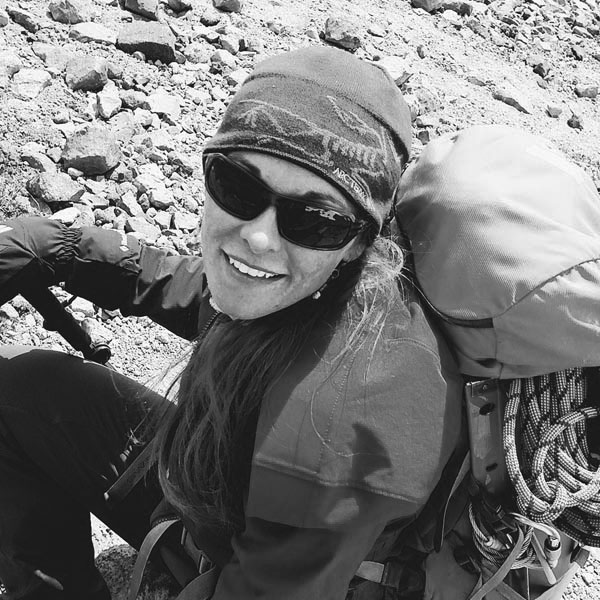Reimagining Recreation
The deer sees me before I see it. This is usually how it goes. Sometimes they bolt, sometimes they stare at me, frozen, waiting for anything to move. I’ve made an art out of courting these deer, trying to see how much of their trust I can earn. Oftentimes, I’ll kneel down, attempting to be as unassuming as possible, but today I need to walk by. I can feel the deer’s eyes and ears on me. A normal walk would not suffice, no no — this required the fox walk. It has nothing to do with how a fox walks, but it’s a certain way of moving across the land. It’s best done barefoot and perhaps with your eyes closed. Basically, you put your heel down first and then slowly feel each step with all of your senses. It can’t be done quickly, which is why it’s perfect for walking past a tentative deer. I don’t have my daughter Josie with me today, but she loves the fox walk. She hasn’t quite mastered the slow and quiet part yet, but she is only three. This is how I spend my days now. This is my recreation.
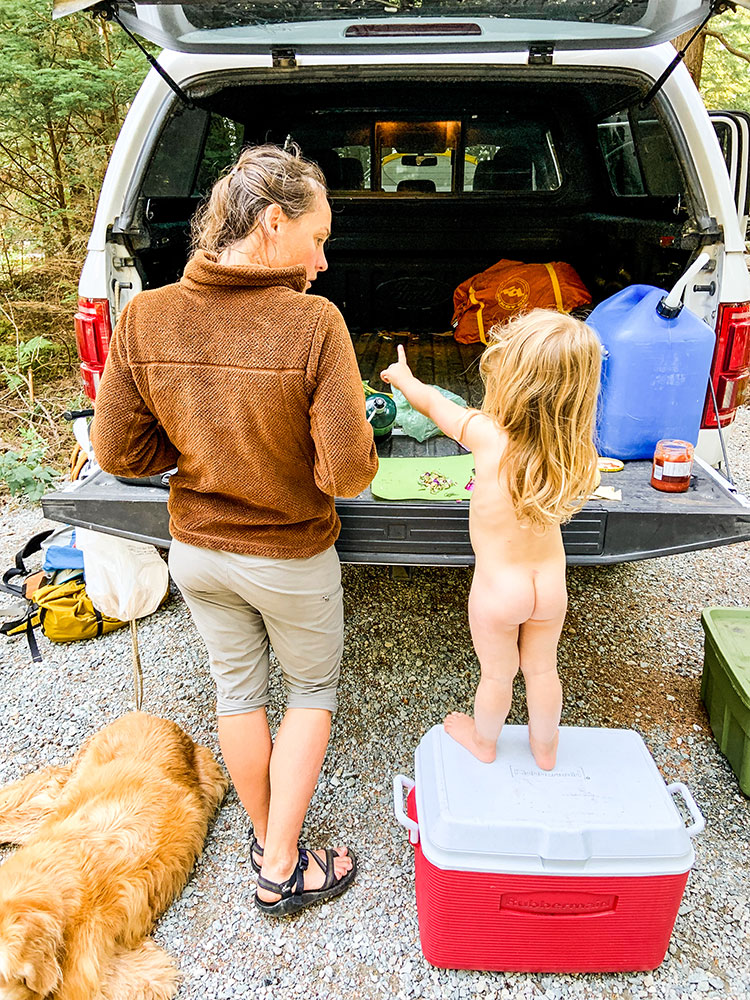
Recreation didn’t always look like this for me. In our modern culture, recreation typically implies “refreshing oneself by some amusement.” The root of recreation, recreare, means “to refresh, restore, make anew, revive, or invigorate.” Like many of you, I’ve spent the last twelve weeks of this pandemic wandering and exercising near my home. I wander, with longing and deep grief for a more meaningful connection with the land. I spend these days reimagining recreation.
Why am I reimagining recreation? Imagination feels like a lost art to me, abducted around the time I learned the scientific method. Imagination is the conversation between me and the mountain, the conversation between me, the ice worms, and the spider in the snow; The conversation between me and the wind, and the conversation between me and the wolverine. Now before you all think I’ve gone mad, think back to when you were a kid playing outside. Try to remember a time when you were in your own world making mud pies, building stick houses, or tending to wounded animals. A time when if someone called your name, you likely wouldn’t have heard them because you were so deep in your world. That feeling you had with the mud, the stories you told about the stick house, and the conversation you had with the wounded animals – those are conversations tended by your imagination. And by imagination, I don’t presume to mean those conversations are made up, quite the opposite in fact. Those conversations are the most real conversations you might ever have had. Moments when we were truly listening and being listened to.
Now that I’ve got you imagining again, I’m sure you’re wondering what this might have to do with recreation?
My relationship with recreation was not always so reflective. Before COVID, before my injuries, before having a baby, recreation was my entire life. And not the kind of recreation I describe above, but rather recreation as a means of exercise, distraction, and amusement.
I used to work as a consultant in an office and I would literally spend my days planning for my weekend adventures, trying to optimize weather and routes, calculating how tired John was going to be coming off Rainier and how much I was going to have to bribe him to go back into the mountains with me. I would come back to work exhausted from the weekend, looking at pictures from the last adventure to survive the next work week. I climbed a great many mountains. I burned hundreds of thousands of calories, ran hundreds of miles. To say this was all recreation meant to me would not be the complete truth. Each adventure, each mile, and each trail rooted me in something beyond my own Self, I just didn’t know it at the time. I was just trying to survive my life.
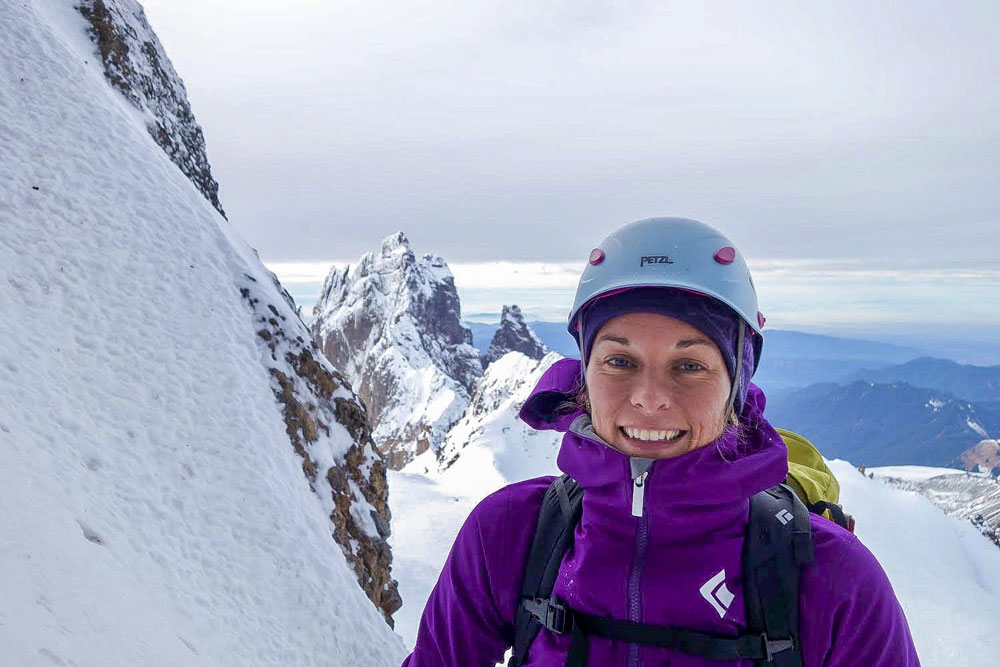
Perfectly Imperfect
The mountains saved me: they showed me myself, showed me my bones, showed me my roots. They reminded me of what I had forgotten along the way. They also broke me. Well… let’s be honest, I broke me. I had zero capacity to listen to my body. I could hear it loud and clear but refused to listen because the allure of the mountains was too tempting. I’m now blessed (and forced by means of injury, kids, and age), to offer my attention to my relationship with recreation and the mountains. In offering my attention, I’m imagining a different way of climbing mountains. I’m imagining being in a relationship with the wild places we wander through to reach the summits. I’m asking myself what that looks like, sounds like, smells like, and feels like. I’m asking myself what speed in which I travel will allow me to cultivate that relationship with these wild places. I’m asking myself why reaching the summit matters. And I’m asking these wild places and beings what I can offer back. Perhaps Martin Shaw is correct in offering that…
What the world truly seeks is to be admired by us.
I’m not perfect. There are plenty of days that I am rushing through a hike or bike ride to get home to pick Josie up and miss all those moments to be in relationship with that particular place — and that’s ok. What I’m imagining is that if each of us, at different times, offered our attention to the places we wander through and each offered something back – a prayer, a song of gratitude, a smile of acknowledgment, a story, tears of laughter or grief – that the wild places would be tended to, all the time. That’s what I’m imagining.
Now, I own a mountain guiding service. I sell recreation. I sell fun, even if it is Type II fun. We encourage people to get outside, to move across the lands, to explore, and help them achieve their goals. We practice Leave No Trace and we pack out our poop. That’s not enough anymore. We can all feel the pressure of all the humans in the backcountry. The desire to push our bodies farther and farther out on the land. I like to remind myself that our playground is someone else’s home.
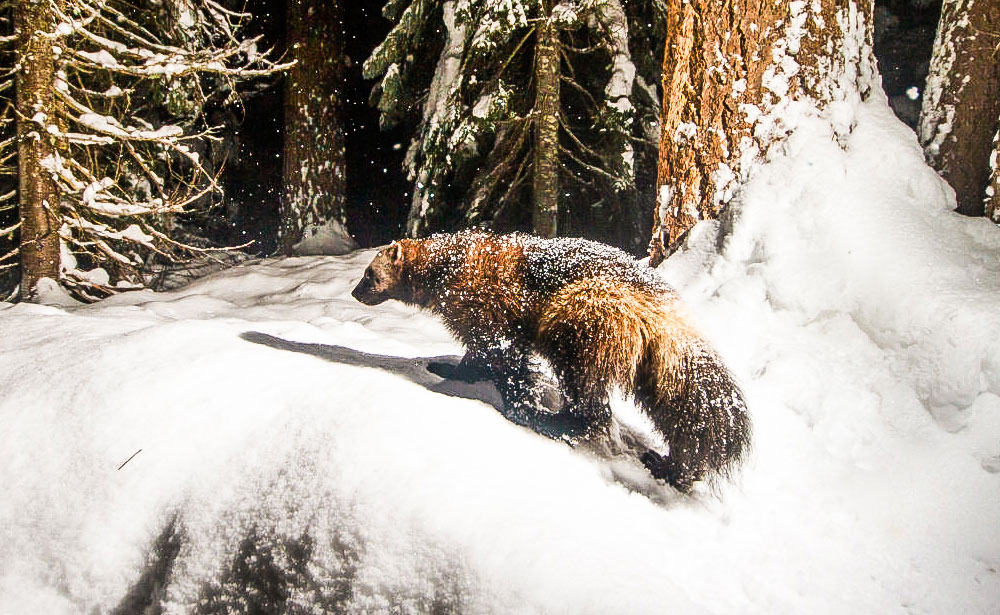
Photo by David Moskowitz – Cascades Wolverine Project
I’ve danced with calling it recreational consumerism. I’m just as guilty as the next, we all are. We all consume recreation to some extent. We’re human, perfectly imperfect. Whether we miss the ice worms while checking our watch to see how many calories we’ve burned or glance over the particular color of blue the ice reflects in the morning sun while we’re contemplating how angry our boss made us. Perhaps you’re stealing a rushed run or bike ride after work and you miss the delicately blooming foxglove swaying in the breeze across the recent clear cut teeming with life after death. Or perhaps you’re thinking about what your partner said or did and you miss the owl sleeping in the tree. Or even worse, perhaps you’re so determined to run your daily 5 or 10 miles, that you ignore just how much your body hurts or how tired you really are. I reckon it’s not only an inability to listen but also an inability to hear.
The Art of Listening
Hearing first requires that you are listening and listening requires that you aren’t talking, out loud or in your head. Listening as a form of offering your attention to someone or something is a practiced skill — perfect for long slogs up a trail or skin track. Listening is only one of our senses. We humans rely heavily on seeing, but we have others – tasting, smelling, feeling, and sensing. The particular taste of the water from the melting glacier, the smell of the sun warming up the forest. A feeling of awe and perhaps grief for the melting glacier, peeled back to its underskin, exposed to the sun for the very first time. The feeling of ancient ice moving under your feet. The joyous sound gear makes clanging on your harness. We can feel the particular way our axe sinks into the ice. That feeling can activate your sense of intuition. Was it a good stick or a bad stick? Your body knows. All of these moments are never to happen again in the particular way you are witnessing and participating with them. All of these moments have secrets to share with you.
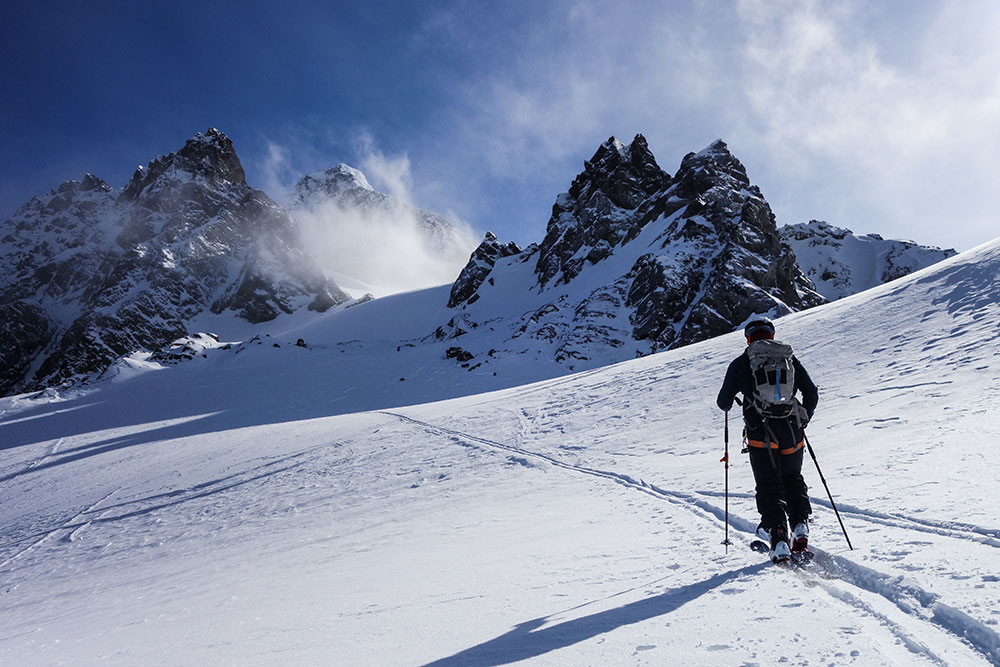
Truth be told I initially found it exhausting to participate in the world and recreation this way – engaging all of my senses. It requires me to slow down. These are skills that need exercise and practice, just like crevasse rescue. I’m also not suggesting that you don’t go for the summit and that you don’t push your body. Those moments when you are completely in tune with your body and the climb are equally as important. Wild feats coming to life can surely feed the soul. This art of sensing is a tool to bring your body back into relationship with the land. When you’re on a ridge and the wind is blowing snow in your face, you can’t see a damn thing, and your heart is beating in your head rather than your chest, you are in a critical moment when the earth is likely speaking to you. I’ve pushed through these moments to the summit and I’ve also turned around. You might make a different decision in that same moment. My point is, the conversation is with you and the moment, if you’ll offer your attention.
This is the relationship with recreation I’d like to cultivate. Terry Tempest Williams says it well,
“As a child, I came to understand my relationship to nature was reciprocal and that nature had a relationship with me. We called to one another. We called one another into being.”
I’d like to create a space where people can dream and imagine their own relationship with wild places and recreation and help them tend those imaginings. Offering safe access to recreation feels even more important as the younger generations have less of a relationship with wild places and more of a relationship with their screens. And this is where I always pause and ask myself what are we offering? Are we selling summit attempts? Or are we creating a space where people can perhaps catch a glimpse of their own soul in conversation with the soul of the Earth while also climbing a mountain? Or is it both or perhaps somewhere in between?
Calling Us Home
Not everyone stayed at home during the quarantine, but many did. In the times I did wander beyond the backyard trails, I could hear and feel the sigh of the Earth from somewhere in the deepest caverns of her belly. A sigh of pause and stillness, perhaps of relief even, as the humans (hopefully) sat in reflection, or sheer boredom – but sitting nonetheless, even if just for a few moments. It was so damn quiet. The silence was deafening. Tears of grief and joy were all I could offer in that moment and even that didn’t feel like enough.
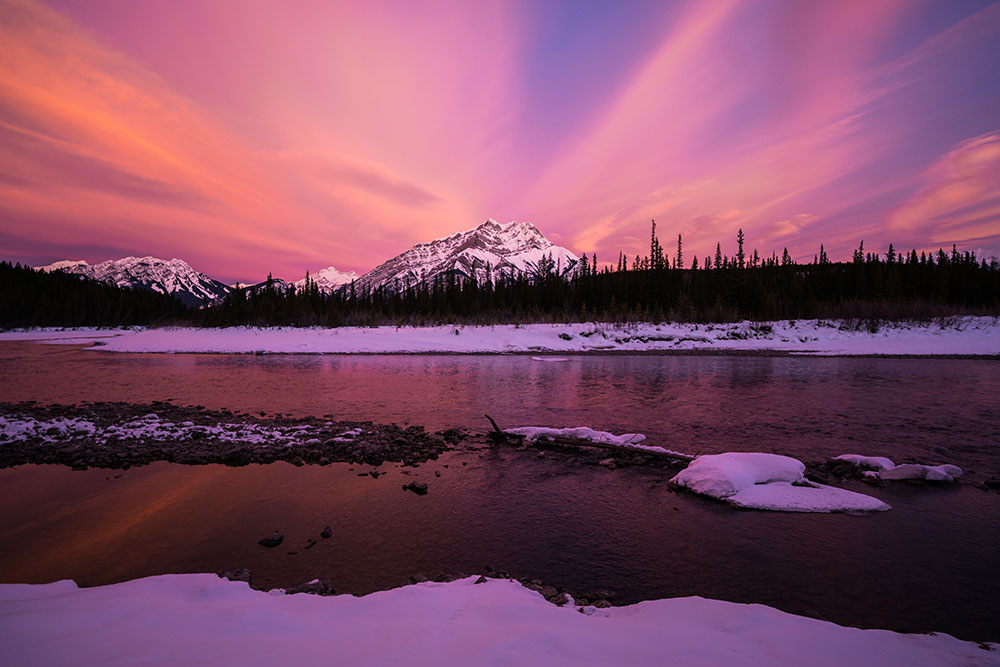
It won’t always feel like this. I crafted my first adventure back into the mountains with an ambitious dance up Mt. Baker. I hadn’t summitted since I was pregnant (Josie is three now), I hadn’t tasted mountain air in twelve weeks, I hadn’t felt the glide of my skis on the frozen skin of the earth. I was hungry for mountain time. Admittedly, that hunger overrode my ability to be in deep conversation with the earth on that climb. And again, that’s ok. What did happen was deep conversation with my partners about why and how we were there doing what we were doing. Conversations I couldn’t imagine happening a year ago.
As we all begin to wander back into the backcountry, we might find the desire to run up summits to make up for lost time, we might find the desire to walk slowly up a trail and find a soft place to sit. I’m hoping it’s both. The earth dreams of our feet dancing along her ridges, sitting in the lakes of her belly, and painting the clouds of her skies. Hear the sound of your feet on her skin. Feel the warmth of the sun on your face. Taste the ice turned to water a second ago. Offer your attention to the earth. Dream with her and she will dream with you. Our playground is our home.
“If we approached rivers, mountains, dragonflies, redwoods and reptiles as if all are alive, intelligent and suffused with soul, imagination and purpose, what might the world become?”
“Who would WE become if we participated intentionally with such an animate earth?”
